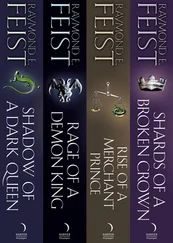A Voice from within Shadows Contents Cover Title Page QUEEN OF STORMS THE FIREMANE SAGA: VOLUME TWO Raymond E. Feist Copyright Dedication Map Prologue: A Voice from within Shadows Chapter One: Hunting and an Unexpected Encounter Chapter Two: An Unplanned Event and A Surprise Reunion Chapter Three: More Mysteries and a Short Journey Chapter Four: Reflections and Bloodshed Chapter Five: Celebration and Murder Chapter Six: Destruction, Abduction, and Rage Chapter Seven: Loss and Determination Chapter Eight: Recovery and Resolve Chapter Nine: Disasters and Questions Chapter Ten: Captives and Mysteries Chapter Eleven: Investigations, Discoveries, and the Unexpected Chapter Twelve: Changes on Fate’s Tides Chapter Thirteen: Plans and Consequences Chapter Fourteen: Reversals and the Unexpected Chapter Fifteen: Appraisals, Guesswork, and Repurposing Chapter Sixteen: Revelations and Secrets Chapter Seventeen: Voyages and Disasters Chapter Eighteen: Choices, Chaos, and Change Chapter Nineteen: Betrayal, Acceptance, and Piracy Chapter Twenty: Planning and Resolutions Chapter Twenty-One: Triumph and Escape Epilogue: Reunion and Dark Harbingers By the Same Author About the Publisher
He was known as Bernardo Delnocio of Poberto, which was the first of many lies about him. His birth name had not been Bernardo, nor was he from a family named Delnocio. That family had been famous and powerful until a war took the last son; he claimed to be a distant cousin, from a lesser branch of the family, with no claim to any legacy but a once-noble name. Nor had he been born in Poberto, a prosperous town surrounded by the villas of the wealthy and powerful. That notable community rested just outside Brojues, the capital city of the Kingdom of Fondrak, home to the Church of the One. Instead, he had come from the poorest squalor of Aliestes, a minor city on the far continent of Enast many miles from the splendour of Brojues.
As a boy, the man calling himself Bernardo had been an abandoned guttersnipe, raised by a gang of urchins. He had grown up roaming the streets, surviving in a vicious world that provided few respites from struggle, living by his wits and a brutal determination to survive, until he had been recruited by the Church.
His natural combativeness and will to survive had been recognized and his early training had been channelled effectively into serving the Church. He had spent nearly ten years as a member of the Order of the Church Adamant, the martial arm of the Servants of the One, soldiers willing to die unquestioningly to defend the faith and, more importantly, attack its enemies without hesitation.
His will to survive had elevated him above the other soldiers, first by avoiding duty that would have trapped him in a permanent role, as a pioneer, engineer, or gynour, though he had been clever enough to learn a bit about building advanced entrenchments, rigging bridges and repairing roads, or operating siege engines, so he became as well-rounded as possible.
He had a knack for accents, and quickly improved his speech so that his common origins faded as he learned to adopt more refined rhetoric and behaviour. He soon became the youngest minor officer in the Church Adamant.
After only three years as a unit commander, he realized the true power wasn’t in the army, but being a cleric in the Church, and that was when his urge to survive had been transformed into a desire to thrive, rise, and become more powerful at every turn. He had surprised, even shocked, his companions when, as a rising young officer, he had announced he was leaving the Church Adamant to take holy vows and become the lowest of the clergy.
He did not remain a minor priest for long. Bernardo was not the most overtly aggressive player in the deadly internal politics of the Church of the One, but he had an intuitive grasp of something few did: he could quickly recognize the true organization of any group, where the power actually resided as opposed to ostensible ranks and titles. He identified those who were public figures and those who moved quietly in the background. Above all, he had a lethal instinct for when an opponent was vulnerable and no hesitation in taking advantage of that recognition.
He immediately understood that while the Council of the Episkopos was the governing body of the Church of the One, there was a handful of men within the Council who controlled every aspect of the Church. The Church priesthood had as many barriers and dead ends as the army had, and picking a path to power had given him a challenge, but surviving in the streets had proved a harsh yet enlightening education.
His natural skills and intuition meant he knew the right moment to act, and more than once he had managed to convince someone else to be responsible for the fall of one of his rivals. He merely suggested something and other people acted, and he made sure they believed it was their own brilliance that had led to the targeted rival’s downfall. Gang leader or powerful episkopos, he could apply his talents equally, discerning quickly who was truly loyal, or easily manipulated or even bought, who might become an ally, and who must be neutralized or even destroyed.
On the streets he had learned early which boys were bullies full of bluster. They came and went, often to an early grave or a slave gang, but the truly clever, the gifted, and thoughtful – they endured. Those were the ones he observed, and listened to, as he sought to survive.
Over the years Bernardo had also found it convenient to shape the truth of his past to suit the fluid politics of the Church of the One. Those who knew the inconvenient facts of his early life were either his closest supporters or dead. Ridding himself of potential enemies had sharpened his naturally keen intellect and driven patience into the very fibre of his being. He had waited months, even years, at times to see a rival dead. His imperturbability was almost legendary within the higher echelons of the Church in Brojues. He was now counted among the wisest of the rulers of the Church, and, by wide consensus, the most patient. Today, he was approaching the end of that patience.
More than once he’d come close to death either in the name of the One, or in establishing his place in the hierarchy of the Church, and right now he’d gladly return to those moments and embrace a quick death.
He sat silently in a large bedchamber in the castle of Lodavico, Most Holy Majesty of Sandura, ruler of the single greatest power on the twin continents of North and South Tembria. Getting Lodavico to sit motionless for hours had proved impossible, but Bernardo had managed to get him to sit for minutes at a time, a small but necessary step in Bernardo establishing complete control over the king and, through him, the Kingdom of Sandura.
The king sat as still as he could while a painter attempted to capture his magnificence on a treated board of cured wood. The artist was a captive from the city of Ithra, taken by one of Lodavico’s oathmen. He had managed to survive the destruction of Ithrace’s capital, avoiding death and slavery but not captivity. His name was Bantiago.
Bernardo watched closely as Bantiago deftly applied colour to the wood and through some artistic magic created a likeness of Lodavico that was flattering but not overtly false. Bernardo understood how the painter had survived the destruction of Ithrace. His superb talents had kept him from death.
Bantiago painted so well that he had been passed from one noble to another over the years, building a reputation and eventually living well by painting brilliant portraits of his captors. Despite still being considered a captive, Bantiago travelled with servants, most of whom were strikingly handsome young men, an apprentice, also handsome to the point of being pretty, and a token guard. It was a captivity to be envied by most citizens of Sandura, thought Bernardo.
Читать дальше












